PHUKET: Rohingya in captivity in Thailand are having to cope with mental health issues as their detention drags on, Thailand's top Immigration officer, Major General Panu Kerdlabpon, said today.
He said there had been 2026 Rohingya detained in Thailand in January but one had died in custody and 91 others - all men and boys - had escaped.
The intention was to assess the status of the detained Rohingya and make a decision about their future at the end of six months, which would occur in late July.
However, government funding had been approved for six months from April, so there was no end in sight for the process as yet, the major general said at Phuket Immigration headquarters in Phuket City.
''One of our concerns is that Immigration facilities were not designed for long-term stays and for now we don't know how long they will be in Thailand,'' Major General Panu said.
Mental and physical health were already issues, he said. However, the Immigration Bureau was trying to cope.
An outdoor area had been set aside at the Immigration centre in Ranong, on the border with Burma (Myanmar), where 84 men were being held, so that 10 people could have some exercise each day, he said.
Two teenagers died in custody in Ranong when a group of Rohingya were held there for months with insufficient light and exercise in 2009.
Thailand's government was ''trying to negotiate'' with Burma - which clearly does not want the Rohingya back - or seek a home for them in a third country, the major general said.
He said that the Immigration Bureau was providing halal food and the opportunity for Burma's unwanted Muslim minority to pray five times a day.
One difficulty was separating the stateless Rohingya, who are deprived of citizenship, from the Burmese, who were more regularly involved in short stays at Thai Immigration centres.
While the future of the 1934 Rohingya being held in Thailand appears to have become a separate issue, little progress appears to have been made in determining the fate of Burma's 800,000 Rohingya inhabitants.
A just-released Burmese government report into violence that led to - according to some estimates - more than 200 deaths and the torching of thousands of homes in Rakhine state last year provides few solutions. It refers to Rohingya throughout as ''Bengalis.''
Most of the Rohingya interviewed by Phuketwan in Thailand have said they do not want to go back to Burma because they would be in fear of their lives.
Major General Panu revealed today on Phuket that of the 91 Rohingya men and boys who had escaped while being held in Thailand this year, six had fled on Phuket, five from Phang Nga, eight from Satun, 33 from Ranong and 39 from Pedang Besar.
Of the 1934 remaining in custody in Thailand Immigation and refuge centres throughout the country, 1439 were men, 76 women, 418 boys and 93 girls.
The flow of Rohingya boats leaving from Burma has slowed but not halted, Chris Lewa, director of the activist group Arakan Project, said today.
One estimate put the number of boatpeople who had fled Burma this October-March ''sailing season'' at a total of 29,000, she said.
''Our numbers are a conservative estimate,'' she said. ''We believe more than 3500 have sailed from the troubled area of Sittwe while the majority have sailed from further north, near the Bangladesh border.''
Small fishing boats of the kind that usually are forced ashore in Thailand are no longer putting to sea, she said.
''We have confirmation of two large vessels arriving in Malaysia recently,'' she said. ''The ships hold 400 to 500 people and are considered safer, so those vessels may continue to come through the monsoon season.''
The larger vessels sail further off the Andaman coast and are usually not intercepted by Thai Navy patrol boats, she said.
He said there had been 2026 Rohingya detained in Thailand in January but one had died in custody and 91 others - all men and boys - had escaped.
The intention was to assess the status of the detained Rohingya and make a decision about their future at the end of six months, which would occur in late July.
However, government funding had been approved for six months from April, so there was no end in sight for the process as yet, the major general said at Phuket Immigration headquarters in Phuket City.
''One of our concerns is that Immigration facilities were not designed for long-term stays and for now we don't know how long they will be in Thailand,'' Major General Panu said.
Mental and physical health were already issues, he said. However, the Immigration Bureau was trying to cope.
An outdoor area had been set aside at the Immigration centre in Ranong, on the border with Burma (Myanmar), where 84 men were being held, so that 10 people could have some exercise each day, he said.
Two teenagers died in custody in Ranong when a group of Rohingya were held there for months with insufficient light and exercise in 2009.
Thailand's government was ''trying to negotiate'' with Burma - which clearly does not want the Rohingya back - or seek a home for them in a third country, the major general said.
He said that the Immigration Bureau was providing halal food and the opportunity for Burma's unwanted Muslim minority to pray five times a day.
One difficulty was separating the stateless Rohingya, who are deprived of citizenship, from the Burmese, who were more regularly involved in short stays at Thai Immigration centres.
While the future of the 1934 Rohingya being held in Thailand appears to have become a separate issue, little progress appears to have been made in determining the fate of Burma's 800,000 Rohingya inhabitants.
A just-released Burmese government report into violence that led to - according to some estimates - more than 200 deaths and the torching of thousands of homes in Rakhine state last year provides few solutions. It refers to Rohingya throughout as ''Bengalis.''
Most of the Rohingya interviewed by Phuketwan in Thailand have said they do not want to go back to Burma because they would be in fear of their lives.
Major General Panu revealed today on Phuket that of the 91 Rohingya men and boys who had escaped while being held in Thailand this year, six had fled on Phuket, five from Phang Nga, eight from Satun, 33 from Ranong and 39 from Pedang Besar.
Of the 1934 remaining in custody in Thailand Immigation and refuge centres throughout the country, 1439 were men, 76 women, 418 boys and 93 girls.
The flow of Rohingya boats leaving from Burma has slowed but not halted, Chris Lewa, director of the activist group Arakan Project, said today.
One estimate put the number of boatpeople who had fled Burma this October-March ''sailing season'' at a total of 29,000, she said.
''Our numbers are a conservative estimate,'' she said. ''We believe more than 3500 have sailed from the troubled area of Sittwe while the majority have sailed from further north, near the Bangladesh border.''
Small fishing boats of the kind that usually are forced ashore in Thailand are no longer putting to sea, she said.
''We have confirmation of two large vessels arriving in Malaysia recently,'' she said. ''The ships hold 400 to 500 people and are considered safer, so those vessels may continue to come through the monsoon season.''
The larger vessels sail further off the Andaman coast and are usually not intercepted by Thai Navy patrol boats, she said.

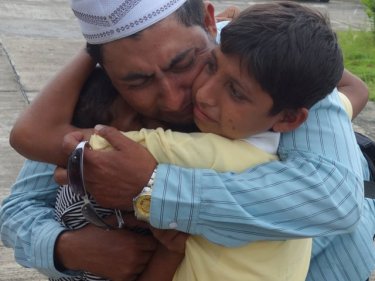





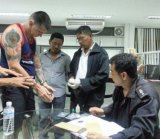

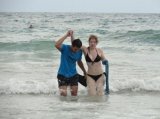

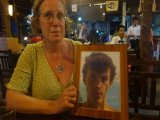


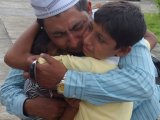





"Mental and physical health were already issues." If only. These people are terrified of life full stop. They have no where to run, no place of safety and no place to go. Damn and the world does nothing about the genocide of these people? Compassion and help be damned. Now money greed and trafficking, YES even children under 5 years young.
Posted by Robin on April 30, 2013 23:08